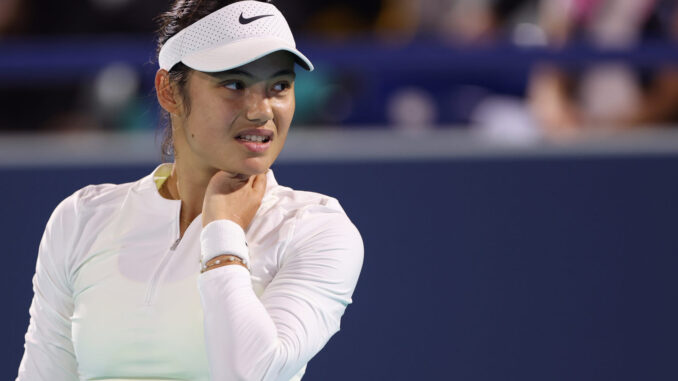
In the ever-evolving landscape of professional tennis, few narratives have captured the public’s attention as intensely as that of Emma Raducanu. The British tennis prodigy, who catapulted to fame with her stunning victory at the 2021 US Open, has experienced a series of highs and lows that have both endeared her to fans and subjected her to the relentless scrutiny that accompanies rapid success. Her recent performances and subsequent decisions regarding her tournament schedule offer a compelling glimpse into the challenges and resilience inherent in the life of a young athlete navigating the global tennis circuit.
Raducanu’s journey in the 2025 season commenced with a sense of optimism and anticipation. However, the early stages have proven to be a formidable test of her mettle. At the Abu Dhabi Open, Raducanu faced a challenging first-round match against the seasoned Czech player, Marketa Vondrousova. Despite a promising start, Raducanu was unable to maintain her momentum, ultimately succumbing in straight sets with a scoreline of 6-3, 6-4. The match was characterized by a series of unforced errors from Raducanu, totaling 32, which underscored the inconsistency that has occasionally marred her performances. This defeat was particularly disheartening as it followed a similar early exit at the Singapore Open, compounding concerns about her form and readiness in the early part of the season.
In the aftermath of these consecutive first-round exits, Raducanu’s immediate tournament schedule became a focal point of discussion among tennis analysts and fans alike. The uncertainty surrounding her next move was palpable, with many speculating on the strategic adjustments she might undertake to regain her competitive edge. Amidst this speculation, it was revealed that Raducanu had accepted a late wildcard entry to the Qatar Open in Doha, a prestigious WTA 1000 event. This decision was met with a mixture of surprise and admiration, as it signaled her determination to confront challenges head-on and seek redemption on a prominent stage.
The Qatar Open, scheduled to take place from February 9 to 15, 2025, at the International Tennis and Squash Complex in Doha, represents a significant opportunity for Raducanu. As a WTA 1000 tournament, it attracts a formidable array of talent from across the globe, offering a platform for high-stakes competition. Raducanu’s acceptance of the wildcard not only grants her direct entry into the main draw but also positions her against some of the top players in the world, providing a litmus test for her current form and resilience.
Reflecting on her recent performances, it’s evident that Raducanu has been grappling with the complexities that often accompany a meteoric rise in professional sports. Her historic triumph at the US Open, where she emerged as the first qualifier to win a Grand Slam title, set a precedent that has been challenging to uphold. The subsequent period has been marked by a search for consistency and stability, both in her game and her support system. Notably, Raducanu is currently without a permanent coach following the departure of Nick Cavaday. This coaching vacancy has prompted her to undertake a period of introspection, aiming to identify the specific guidance and mentorship that will best support her development moving forward.
In her own words, Raducanu has emphasized a day-by-day approach to her career at this juncture. She has articulated a desire to remain attuned to her physical well-being and to make strategic decisions that align with her long-term objectives. This pragmatic outlook reflects a maturity that belies her years, as she navigates the pressures and expectations that have been thrust upon her. The decision to compete in Doha can be seen as a manifestation of this mindset—a calculated move to engage with high-caliber competition while assessing her readiness and areas for improvement.
The tennis community has been keenly observing Raducanu’s trajectory, offering a spectrum of perspectives on her recent challenges. Former players and commentators have noted the importance of match play in regaining form, suggesting that consistent participation in tournaments is crucial for building the resilience and tactical acumen necessary at the highest levels of the sport. The consensus underscores the notion that, while early exits are setbacks, they also provide invaluable learning experiences that can catalyze growth and development.
As Raducanu prepares to take to the courts in Doha, the narrative surrounding her continues to evolve. The upcoming tournament presents not only a chance for redemption but also an opportunity to redefine her path in the 2025 season. The challenges she has faced thus far have illuminated the multifaceted nature of professional tennis, where physical prowess must be harmonized with mental fortitude and strategic clarity. Raducanu’s journey serves as a compelling case study in the dynamics of early success and the subsequent quest for sustained excellence.
In conclusion, Emma Raducanu’s acceptance of a wildcard entry into the Qatar Open signifies a pivotal moment in her burgeoning career. It reflects a resolve to confront adversity and a commitment to continuous improvement. As she steps onto the courts in Doha, the tennis world will be watching with bated breath, eager to witness the next chapter in the story of a young athlete whose potential continues to captivate and inspire.
Leave a Reply